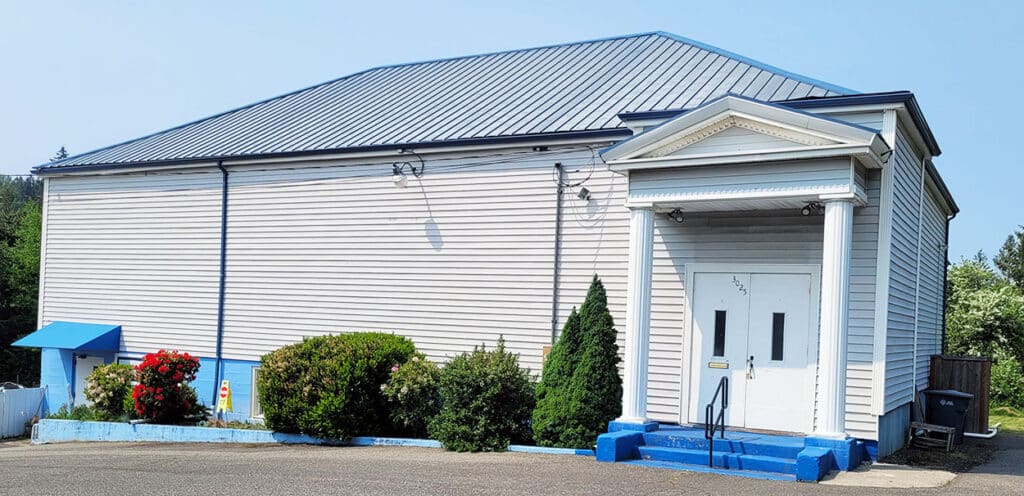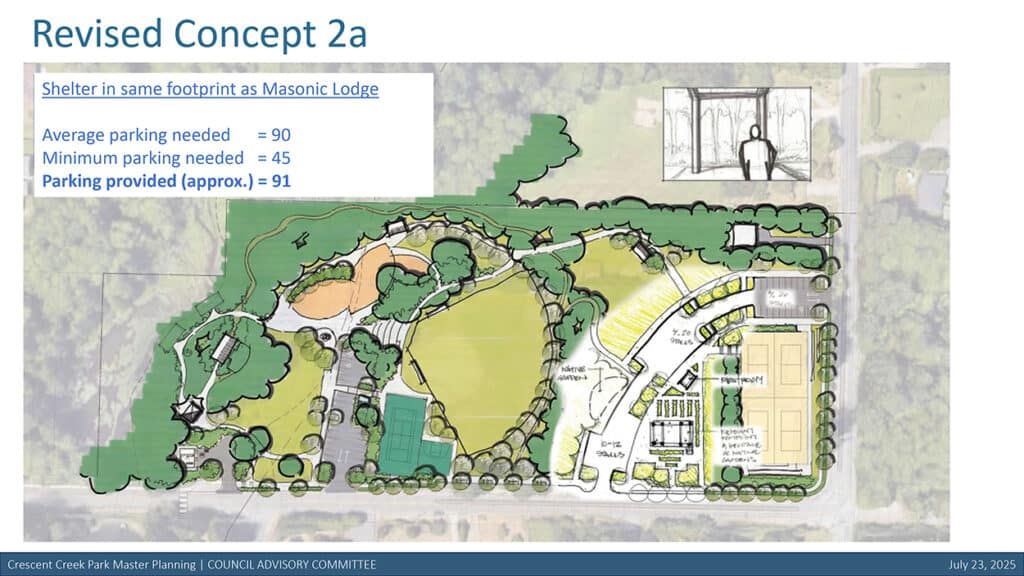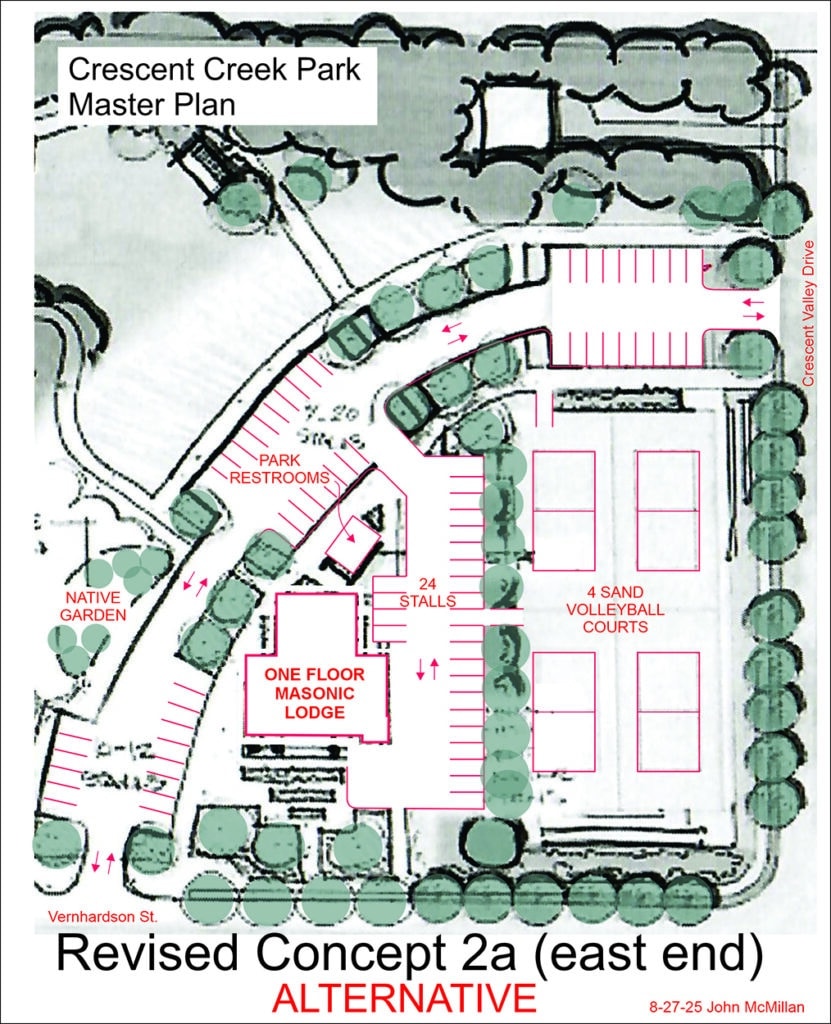Community Government
Gig Harbor Parks Commission recommends against restoring Masonic Lodge
At a meeting on Sept. 3, Gig Harbor Parks commissioners officially recommended demolishing the Masonic Lodge at Crescent Creek Park as part of the park’s proposed revamp. Commissioners discussed their decision at length after presenting the recommendation to Parks Department officials.
“It was a long discussion with lots of details — and it actually was one of the most robust discussions that we’ve had,” Parks Commission Chair Louise Tieman said in presenting the commission’s recommendation. “When the vast majority of the people want the park as a play and walking space, connection to the open nature, we just couldn’t justify … the city restoring this building.”
The commission has two primary concerns over restoring the lodge: The $4.5 million price tag attached to a restoration and coming up with parking spaces to accommodate peak use times.
Tieman said that she expected “real community angst” over the commission’s recommendation. She also reminded listeners that this was simply a recommendation, not a decision.
The Gig Harbor City Council will discuss the Parks Commission’s memo at its study session at 3 p.m. Thursday, Sept. 11. The council will also discuss a preferred draft master plan for the park at a study session in November, and vote to formally adopt a plan in December.
The council previously considered a plan to demolish the lodge in 2023. Following an outcry from the public, however, the council declined to vote on the plan.
Alternatives
The Parks Commission’s recommendation doesn’t mean there are no middle-ground alternatives. Some commissioners peppered the Sept. 3 meeting’s discussion with thoughts on how the lodge could continue, in some form. They touched on Save the Lodge proponent John McMillan’s suggestion for an alternative redesign concept.

The former Crescent Valley School and Masonic Lodge building
McMillan and others who belong to Save the Lodge advocate for the city to preserve the lodge. Built in 1915, the building functioned as a schoolhouse until the Masons bought it in 1949 and rebuilt it as a Masonic Lodge.
McMillan said saving the Masonic Lodge is not necessarily the goal behind his and others’ desire to see the city preserve the building. It’s more about a community meeting space than anything.
“We don’t have a meeting space of this size in Gig Harbor on this side of the highway … I think Save the Lodge is more metaphorical than anything,” McMillan said in an interview. “Let’s save what could continue to be a great meeting space for the community, as it has been in the past — and this would be the ideal spot for it, even if we had to tear down the existing structure and rebuild that one-floor design.”
Importance of public comment
During the recommendation discussion on Sept. 3, Tieman acknowledged that the city hadn’t “really developed that community needs statement and proven that that building meets the needs of the community.”
Tieman highlighted how much public comment supports successful preservation and restoration efforts.
“I have observed over the years on Ancich and other projects that when people show up and spend their three minutes of public comment, it makes an enormous difference — more than letter writing, more than phone calls,” Tieman said. “If you want to help push this, I highly recommend showing up, speaking up, and getting some friends to show up and support.”
Survey says …
Parks Commissioner Kim Anderson remarked that a May survey the commission put out showed that “overwhelmingly, in my view, there was many more people that said no building.”
The survey asked for people’s thoughts on each of the proposed park redesign plans, rather than yes or no questions.
Crescent Creek Park survey by vince.dice
McMillan said that he read the survey differently. He said that, from his reading of the responses, about 47% of respondents were in favor of saving the lodge.
“We can’t just turn that down as being insignificant when there’s a lot of people that feel strongly about this,” he said.
There may also be stronger community support than the responses to the city’s survey indicated.
In July 2024, McMillan and several others interested in preserving the building, including Harbor History Museum Director Stephanie Lile, submitted a proposal to the city that included the results of two public surveys and several meetings. The group said that the results — more than 1,000 responses to their first survey, and 223 responses to their second survey — indicated strong community support for repurposing the lodge.
McMillan also added that, in its survey, the city included the cost of restoring the Masonic Lodge, but did not include costs for anything else. He said this felt biased, even if it wasn’t meant to be.
“A group of local residents created a plan to remodel the Masonic Lodge into a community events space, with museum storage in the basement,” the survey question read. “This plan is estimated to cost $4.5 million. Specific funding sources have not yet been identified. What are your thoughts?”
Price, parking and PROS
Most of the commission’s concern about saving the lodge as-is regarded the $4.5 million price tag attached to bringing the lodge up to code, and ongoing maintenance costs. The cost of any redesign, lodge or no, could also significantly increase, because tariffs may compound what would be normal, expected year-over-year rise in the cost of labor and materials.
Tieman also pointed out that the city had several unfunded projects, like improvements at Wilkinson Farm Park and extending the Cushman Trail, that Gig Harborites told the city they wanted in Gig Harbor’s 2022 Parks, Recreation, and Open Space (PROS) Plan.
“Part of our obligation is to be responsive to the PROS plan, as … the people’s voice to us,” Tieman said. “And then we were aware of these budgeting shortfalls. … What do you spend your very scarce dollars on?”
Historical designation
The Save the Lodge committee initially predicated at least some of its fundraising efforts on getting an historical designation. But the city’s architect said that the building has been too altered from its original state as a schoolhouse to be considered a historic building.
McMillan acknowledged that “money, of course, is a big issue,” but that Gig Harbor is not the only community struggling with budget shortfalls.
“So how are people addressing this? Maybe some are putting these projects on hold until things look a little brighter, until they’ve got money that they find they’ve set aside for a particular project,” McMillan said. “In other words, leave this space vacant until such time as it is affordable. I know costs keep rising every year, but if money is the issue, then at least allow for it to happen in the future and not spend a million or two million dollars on a shelter when that money could be used to go toward a larger community space.”
Other activities at the park
The commission also cited parking needs as a factor in its decision. Commissioners said that popular use times for other parts of the park, like the baseball field, would mean that the city would have to come up with extra parking spaces if the lodge stayed.
“Granted, we don’t know, as we sit here, what the use times would have been for the lodge rebuild. But it’s significantly better if we don’t have the lodge,” Tieman said.
Commissioners also said that the lodge is in an unsafe state of disrepair, including mold, asbestos, and lead throughout the building, and water infiltration in the basement.
McMillan said he understands that the cost to preserve the structure may be prohibitive, but also suggested that the city look towards other successful historical projects in town, like Skansie Netshed. But also said that the city shouldn’t only be considering cost or parking.
“Just look at the whole picture and evaluate the space and what it could be,” McMillan said. “Not just, ‘Okay, we get 10 more parking spaces’ — which would be a sad commentary on us to think of parking as being more important than a gathering place for all of us.”
This is also why McMillan has come up with an alternative that he feels is both viable, cost-effective, and meets the city halfway.
Alternative concept
At the Gig Harbor City Council’s July 31 study session, the council chose park redesign Concept 2A, and said that they would continue to show the Masonic Lodge as an alternative. Gig Harbor’s design calls for creating a covered shelter.

Concept 2A, one proposed option for Crescent Creek Park, would replace the Masonic Lodge with a shelter.
To that end, McMillan said, he created a design that doesn’t preserve the original lodge, but that instead offers a one-floor alternative that he feels preserves historical character and meets the city halfway — and would cost less than saving the lodge.
McMillan has proposed an entirely new building. His design places a one-floor Masonic Lodge in the exact spot as the current lodge, and adds 24 new parking stalls between the lodge and the volleyball courts. Like the city, McMillan also retained the native plant garden. His design also features separate park restrooms, because the one-floor lodge will only have restrooms for the lodge itself.
Getting rid of a basement both lowers the cost and eradicates the issue of mold and water infiltration.

John McMillan proposes a single-floor building to replace the current Masonic Lodge.
McMillan estimates this would cost somewhere between $2.5 million to $3 million. The Parks Department does not yet have numbers for how much its Concept 2A would cost.
New, but honoring the past
Parks Department Manager Jennifer Haro touched on McMillan’s proposal at the Sept. 3 meeting, after the commission unanimously voted to send the recommendation to council. She noted that it appeared the steps were missing from the building’s front, that the foundation was different, and that it appeared to be a new building.
Parks Commissioner Guy Magnus suggested that the city use the money the group would have raised to build a new lodge nearby. But later in the meeting, Parks Commissioner Hanley Bonynge said that the commission’s directive is not to solve the problem. It is only to evaluate the proposal.
“We just don’t want to be put in a position where [we are asked], ‘What’s your alternative?’” Bonynge said.
McMillan explained that his design shows what a one-floor, ADA-compliant meeting space that retained historical character — not that was strictly historically designated or preserved — could look like. He said that his design retains “a lot of historic appearances or artifacts … of the old schoolhouse, actually.”
“And that would be the main entryway, but it would be for 150 people, have a kitchenette, and there’s ample parking there for that activity,” he continued. “It certainly is going to be a lot less money than preserving an old historic building, especially one that’s got a basement. And I think a lot of folks, including some of the historic people in town, would agree that if cost is the big issue, they’d be quite content honoring the past with this new design, this new one-floor design.”
Fall elections
McMillan also wondered whether councilmembers would be allowed to vote on a final design in December, given that those who would be voting may not be in those seats come January 2026.
“Is it fair for people that are on their way out to be voting for a real critical issue here?” McMillan asked. “I don’t know what the policy, the procedure is for that. Or should council table this ‘til next year, for instance, when these new folks are in their seats and able to make decisions.”
